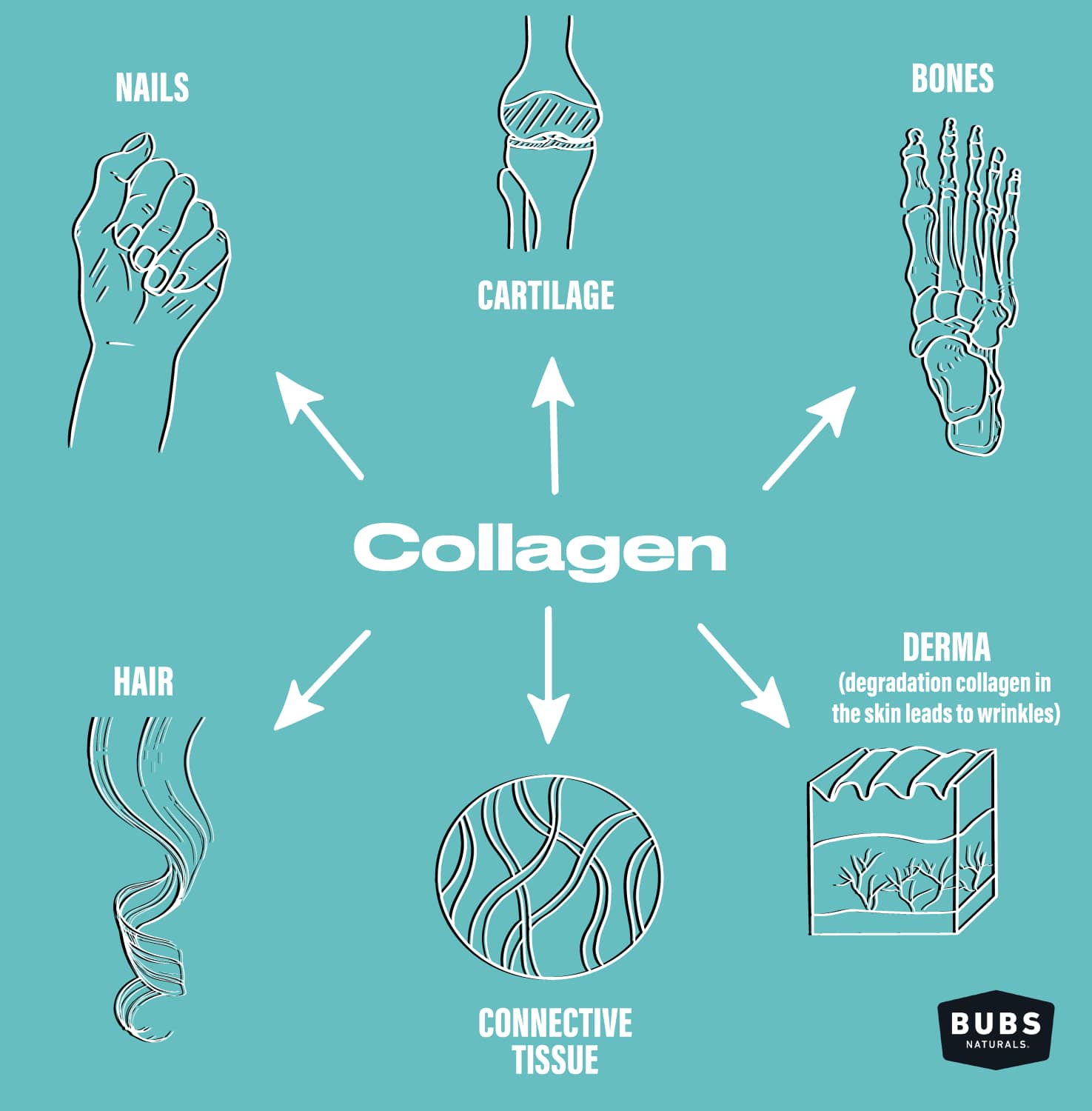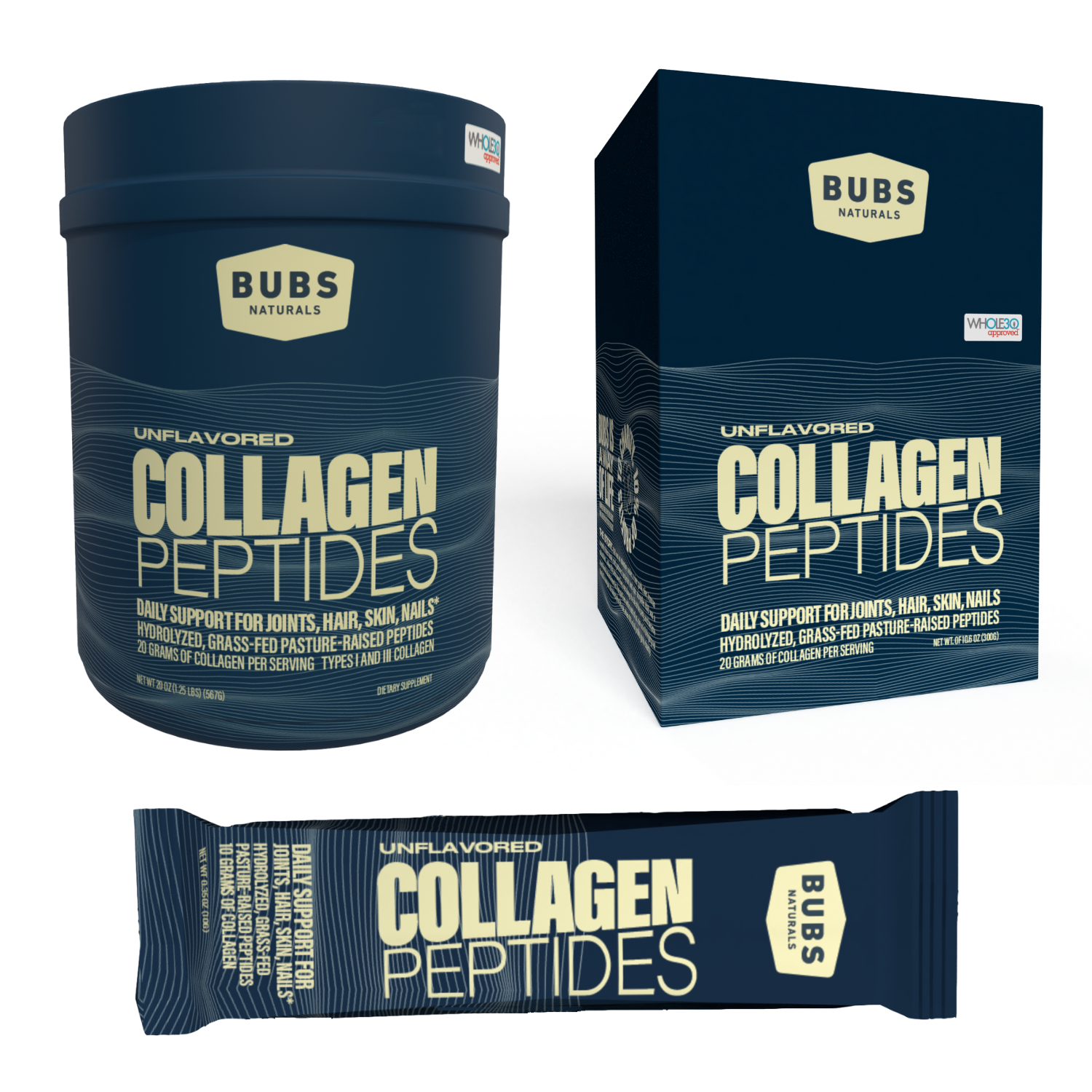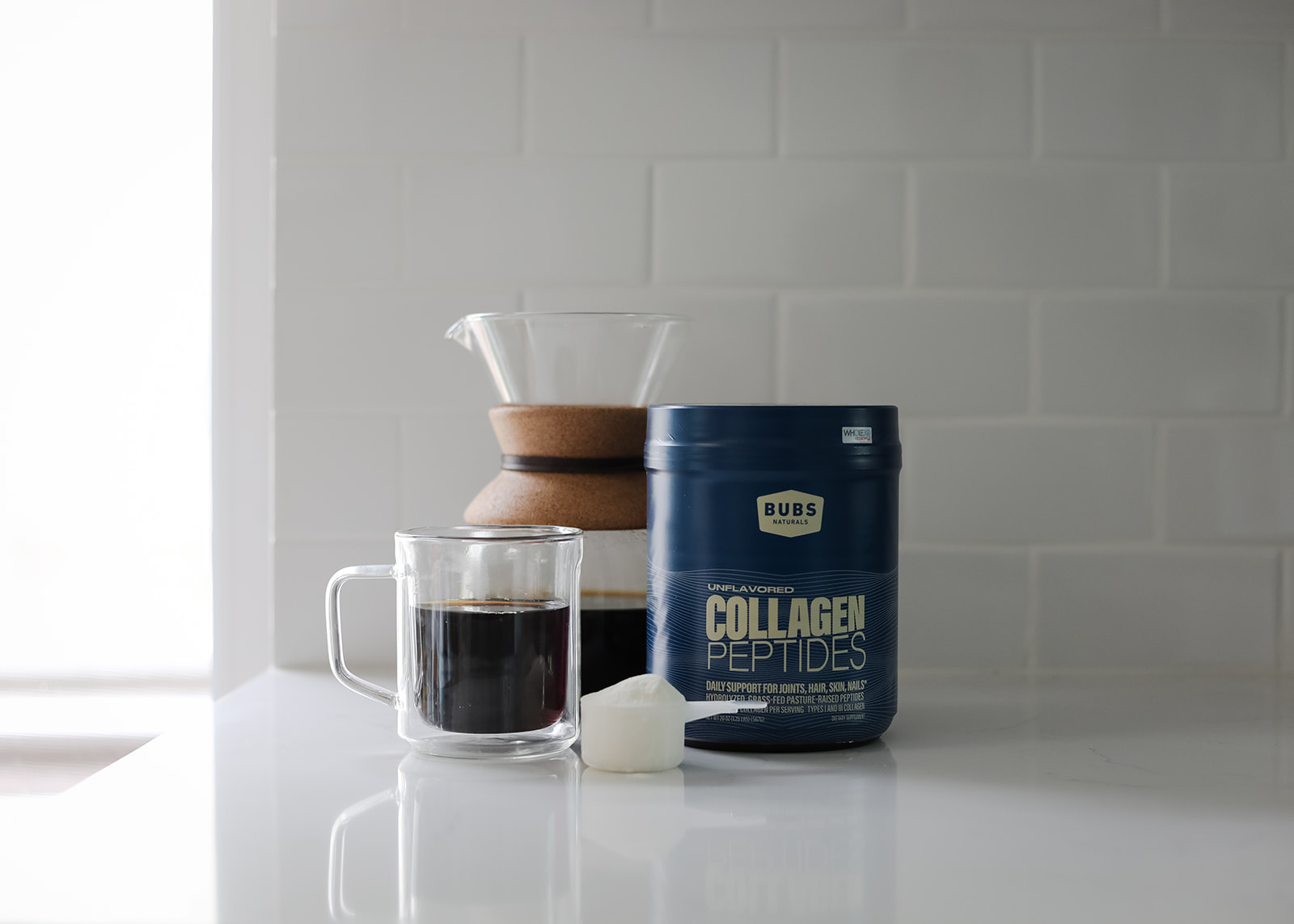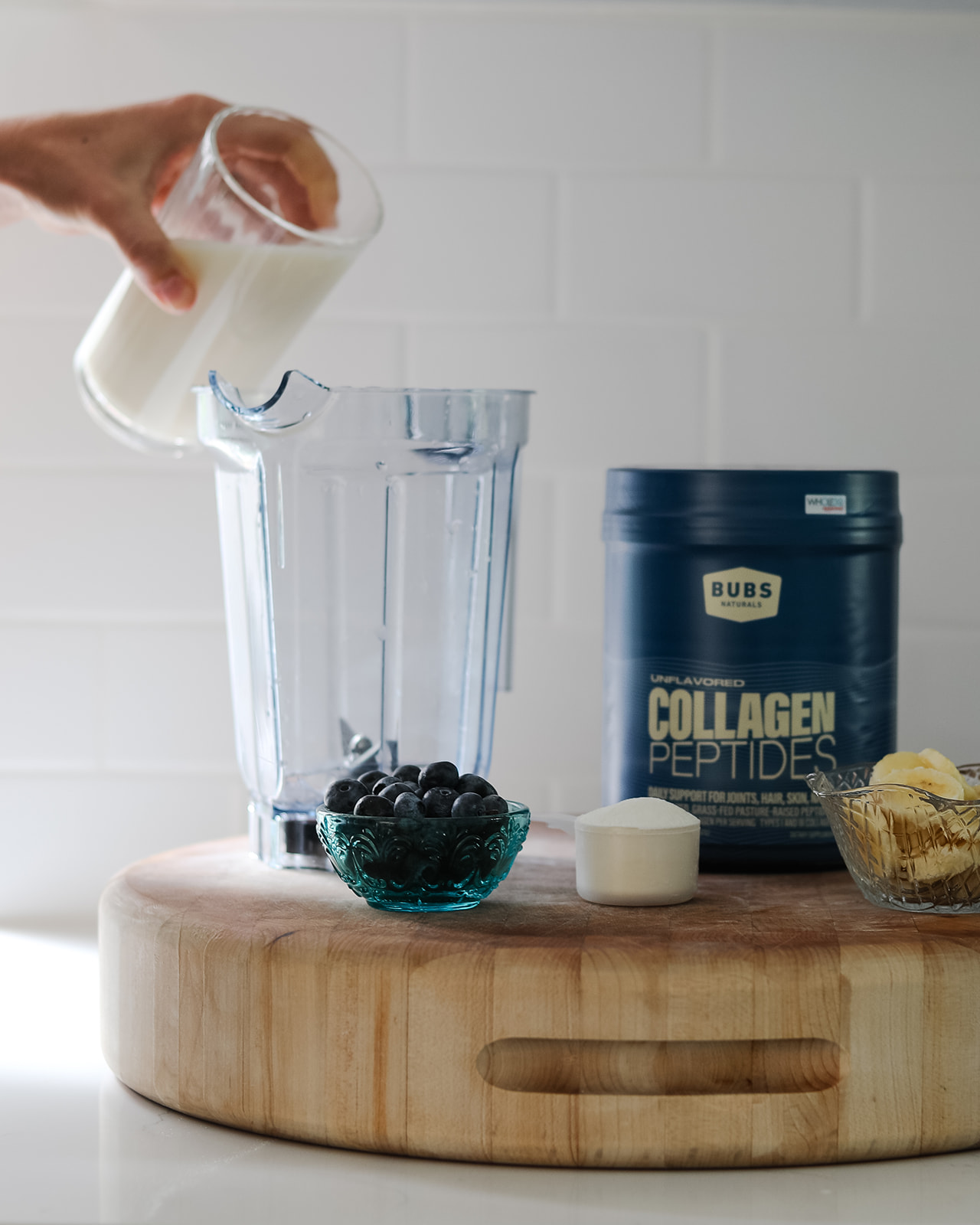Everything You Need to Know About Collagen PeptidesUpdated 2 years ago
What is collagen?
Collagen is a fiber-like structure used to make connective tissue, and it’s also the most abundant protein found in the human body. You’ll find collagen in our muscles, tendons, cartilage, skin, and bones. Besides being a foundational building block, collagen is essential for tissue repair, skin stretching, and for maintaining a healthy immune system.
Proteins are made from amino acids, and the main amino acids that make collagen are proline, glycine, and hydroxyproline.
Collagen is responsible for healthy joints and skin elasticity. As we grow older, our body's ability to produce collagen decreases, causing it to break down at a faster rate. On top of this, as we age, collagen is also lower in quality.
While collagen can be difficult to measure, you can notice that your collagen level is decreasing by spotting some of the common signs:
Less flexible tendons and ligaments
Skin wrinkles
Weak muscles
Worn-out cartilage or joint pain
Gastrointestinal issues caused by thinning of the lining of the digestive tract
If you spot some of these signs, it means that your body needs collagen supplements to support the production of collagen.
Can collagen be absorbed through the skin?
Maybe you’ve seen creams, lotions, and body care products promoting the fact that they contain collagen and found yourself wondering, “Will this form of collagen do anything for me?”
It’s a popular marketing ploy, but the reality is this: the only way to supplement your body’s collagen is by ingesting it in supplement form. The reason for this is that collagen molecules are simply too large to be absorbed through the skin. When you ingest collagen peptides, however, you get the nutritional benefits that help revitalize your skin from the inside out.
What are collagen peptides?
Hydrolyzed collagen (also known as collagen peptides) is collagen that's been broken down into more easily dissolvable amino acids which are absorbed by the gastrointestinal tract.
The process of breaking down the collagen protein into fragments is called hydrolysis. Hydrolysis pulls solid peptides from the liquid mixture so it can be a powder. After the solid peptides are removed from the water they are sterilized and then tumble-dried, which promotes solubility.
During drying, high-quality peptides also go through a process that creates a slightly thicker powder particle, which means more surface area so that it can dissolve faster. Since collagen is like a glue, lower-quality collagen peptides will congeal when added to water, creating a lumpy texture. (You’ll know it when you see it!)
Why do I need a collagen supplement?
Since the natural production of collagen decreases with time, people need collagen peptide supplementation to help the body replace its lost collagen. Collagen loss starts after the mid- 20s, and research shows that collagen production declines by about 1.0%-1.5% a year.
According to past studies, by the time the average person is 80 years old, collagen production in sun-protected skin is decreased by approximately 75% relative to production in the corresponding skin of young (18 to 29 years) adults. The issue of collagen production gets exacerbated by stress, sun exposure, smoking, and alcohol.
There are three different forms of collagen—collagen peptides, gelatin, and undenatured type II collagen. However, collagen peptides (or hydrolyzed collagen) are the most effective form of collagen supplementation because of their lower molecular weight, making them more accessible to the body.
What types of collagen exist and which one is best?
There are dozens of types of collagen, each with a slightly different amino acid composition and function. However, only five are commonly used in collagen supplements.
Type I collagen is the most prevalent type of collagen in the body. Besides helping with the health of your skin, hair, and nails, it is also a major component of the tendons, organs, and bones
Type II collagen is the main component of cartilage and is extremely important for the skeletal system
Type III collagen is the second most abundant collagen of soft tissues, and it is a major structural component in hollow organs such as large blood vessels, uterus, and bowel
Type V collagen is found naturally in the eye, helping light pass through the cornea. However, further research is necessary to determine whether the body can break down type V collagen supplements
Type X collagen can be found in joint cartilage and is responsible for bone formation. Similar to Type V, there’s a need for additional research, as there is no specific evidence that suggests taking supplements with type X collagen will help in healing an injured area.
Collagen supplement ingredients come from a variety of animal sources. Bovine collagen made from cows is rich in types I and III collagen. Marine collagen made from fish contains type I and II collagen. Poultry collagen made from chickens contains type II collagen.
Choosing the right collagen depends entirely on what you want to achieve. Type I and Type III collagen work synergistically within the body. Besides the fact that they are naturally the most abundant, they are both found in bone, cartilage, joints, skin, and other connective tissue. These forms are helpful when working to decrease joint pain, improve joint mobilitiy, and help with healing joints and tendons post-injury.
Over 90% of hair, skin, nails, bones, and ligaments are made up of Type I collagen, making it the perfect type to supplement with, and Type III collagen not only supports skin, bone, and joint health, but it can also support or maintain gut health while boosting cardiovascular health. A 2022 study found that oral collagen supplements help reduce or delay skin aging by improving hydration and elasticity while minimizing wrinkles.
BUBS Collagen Peptides are made of both Type I and Type III Collagen. Starting out as grass-fed bovine collagen, BUBS Collagen Peptides are then turned into collagen peptides through a controlled enzymatic hydrolysis process. This process transforms the collagen into much smaller and easily digestible peptides.
What is the difference between collagen protein and collagen peptides?
The key difference between collagen and collagen peptides is the fact that collagen is a complete protein, while collagen peptides are fragments of that protein. Since collagen is a full-length molecule, it is difficult for the body to digest or absorb. Collagen peptides, on the other hand, are short chains of amino acids derived from collagen. As a result, they are significantly more bioavailable.
The word bioavailability refers to the part of the substance that is actually able to enter your bloodstream and be put to good use, once introduced to the body. In other words, it refers to how much of a supplement is actually being absorbed by the body rather than just passing through and being eliminated.
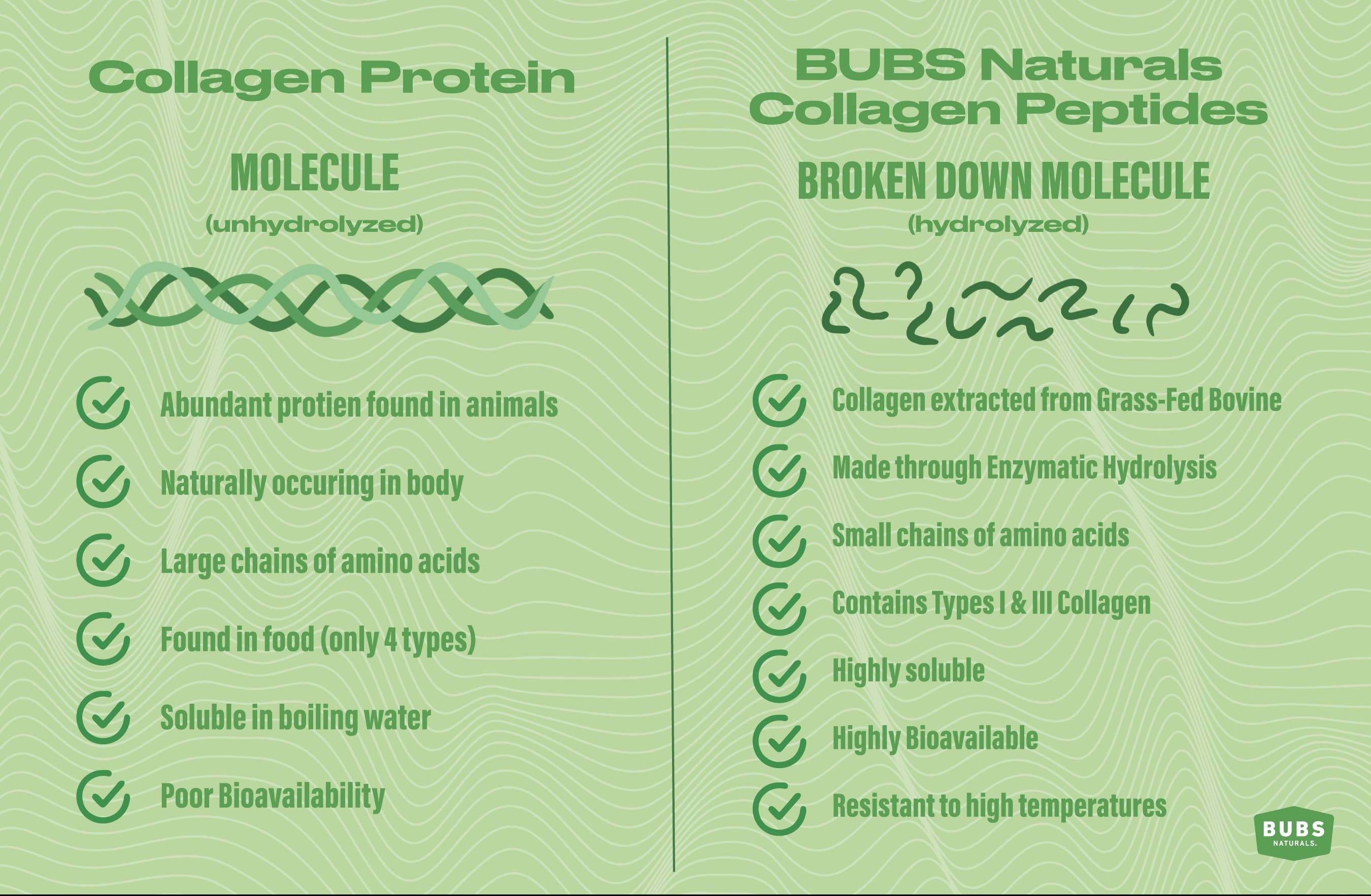
What to look for in a collagen powder
While there are many different collagen powder products on the market, here are three tips that will help you find the best collagen powder.
Look for collagen from organic sources — When choosing a collagen powder, it’s essential to ensure that it comes from organic animal sources that are grass-fed and antibiotic-free. This helps avoid potential exposure to toxins, heavy metals, or other unwanted byproducts. BUBS collagen powder is sourced from grass-fed, hormone-free cows in South Brazil and Uruguay.
Look for fully hydrolyzed collagen — Scientific studies have shown that hydrolyzed collagen powder has the ability to absorb quickly into our bloodstream. Be sure the collagen powder you choose was formulated to absorb in your body rather than quickly pass-through.
Look for a collagen powder that fits your diet — Following a certain diet doesn’t mean you should compromise with your collagen supplementation. Instead, look for collagen powder that fits your diet. BUBS Collagen Peptides are gluten-free, soy-free, nut-free, and corn-free, and work with Keto, Paleo, and Whole30 diets.
Some collagen powders on the market don’t provide much insight into how their collagen is derived, processed, and manufactured, so be sure you understand these details before you make a purchase.
Benefits of using collagen peptides
1. Improve skin health
Skin health is one of the most researched benefits of collagen peptides. Studies have shown that collagen supplements improve skin elasticity, turgor, and hydration and reduce skin wrinkling and roughness. As a result, collagen peptides can contribute to reducing or delaying skin aging.
2. Relieve joint pain
Collagen is proven to help support the connective tissue in your joints. One study found that the daily intake of 5g of collagen peptides led to a statistically significant reduction in activity-related knee joint pain after a 12-week treatment. This is especially important for physically active individuals who are faced with frequent joint pain.
3. Prevent bone loss
Collagen can also play a role in supporting bone health. According to research, supplementation with 5g of specific collagen peptides significantly increases bone mineral density of the lumbar spine and the femoral neck, as well as higher levels of a blood biomarker that indicates bone formation in postmenopausal women.
4. Boost muscle mass
Collagen levels drop as we age, which can lead to a decrease in muscle mass and an increase in joint and skin issues. One study suggests that combining collagen peptides with resistance training contributes to muscle mass, body mass, and strength. These results are due to the presence of the important amino acids found in collagen.
5. Promote heart health
Collagen helps maintain heart health by providing structural support to the arteries, which are responsible for transporting blood from the heart to various body parts. According to one study, 2.5 grams of collagen per day lower arterial stiffness and contribute to the prevention of atherosclerosis.
6. Increase the strength of hair and nails
If you’re struggling with thin hair and brittle nails, collagen can help. According to research, collagen peptides can decrease hair shedding and promote hair growth. Another study shows collagen peptides treatment promoted an increase of 12% in nail growth rate and a decrease of 42% in the frequency of broken nails.
7. Promote gut health
Adding collagen to your diet can also help you maintain your gut health. There is evidence that a 20g daily collagen peptide supplement may reduce bloating and improve mild digestive symptoms in otherwise healthy female adults in the absence of any other dietary or lifestyle interventions.
8. Improve brain health
Protein deficiencies slow down development and lower cognitive function. On top of that, new research shows that the lack of a protein in the brain that keeps our tissues healthy as we age is linked to Alzheimer's disease. Here’s where collagen supplementation can help. It’s been proven that daily ingestion of collagen peptides can have a positive effect on brain structure and may improve cognitive language ability.
9. Promote faster metabolism
Adding collagen peptides to your diet can boost your metabolism by building lean muscle mass and aiding in the absorption of vital nutrients. According to a study, collagen peptides have anti-obesity effects through the suppression of fat accumulation and regulation of lipid metabolism.
10. Help with weight control
Choosing protein-rich foods can help you feel full for longer, reducing the need for snacking and unnecessary calorie intake. Collagen is a beneficial protein option, but it's essential to choose a powder without additives or unnatural ingredients. BUBS Collagen protein powder is crafted with pure collagen, ensuring a natural and healthy addition to your diet.
When is the best time to take collagen protein powder?
One of the most common questions people have when starting to incorporate collagen into their diet is: when is the best time to take collagen protein?
The short answer is: anytime. While most people choose to add it to their morning coffee, making it easy to incorporate it into their daily routine, the full benefits of collagen peptides can be reaped no matter what time you choose to take it—as long as you are getting the full recommended dose.
Pro tip: Finding a collagen protein powder that’s available in a travel-sized packet or portion helps ensure you’re able to work it into your busy, on-the-go schedule by taking it with you for later use.
Whether you prefer to take it in the morning with your coffee, in the afternoon as a pick-me-up, or at night with a smoothie, it’s essential to take it on a daily basis, not only to supplement your diet, but also to help boost your body’s overall production of collagen.
How much collagen should you take daily?
When it comes to the dosing of collagen peptides, before determining how much collagen to incorporate into your diet, you have to consider your lifestyle.
If you exercise regularly and engage in intense activities such as cardio workouts, you will require more protein than someone who is mostly sedentary. Moreover, your stress levels and the environment you are exposed to, such as the harmful UV rays from the sun, can also influence how quickly your body breaks down collagen protein.
Based on a number of clinical trials, the recommended daily dosage of collagen peptides varies from 10 to 20 grams, and a pre-clinical study shows that you need as little as one to three daily grams of collagen peptides to support joint health.
How to combine collagen peptides with other food
Incorporating collagen peptides into your daily diet is easy. There are so many interesting ways to add collagen protein powder to your meals without having to waste a lot of time or compromise the taste. People mostly opt for the easiest use cases by mixing collagen protein powder into drinks or liquid-based foods such as yogurt, oatmeal, smoothies, and acai bowls.
But there is so much more you can do! If you need more ideas, here are five ideas on how to combine collagen powder with other food.
1. Add it to hot foods — Collagen powder works great with stews, soups, and chilis. To add collagen protein powder to your soup, stir it in towards the end of the cooking time on the stove. The powder should dissolve easily into the soup. If you notice any lumps or bubbles, use a whisk or spoon to gently mix them into the soup.
2. Bake with collagen powder — Cooking doesn’t destroy collagen or its health benefits. This makes it a great addition to baked goods. You can easily blend collagen peptides into pancakes, waffles, muffins, and brownies and still get the rich flavor and texture while also consuming extra protein.
3. Work it into sauces — Another way to use collagen protein is by stirring it into sauces and gravies. Again, powdered forms of collagen peptides blend easily and don’t change the taste of the dish. If you're making a meat-based gravy, you can add it to the drippings.
4. Mix it into your mashed potatoes — Mashed potatoes are rich in vitamins like C, B6, and manganese. If you want to get more protein on top of that, try stirring some collagen powder into your mashed potatoes for an extra boost without affecting the taste or texture.
5. Add it to homemade jelly — If you’re a fan of homemade jelly, play around with collagen protein. Add the collagen peptides to your jam mixture as you add the sugar or thickening agent, and let it sit as you otherwise would.
BUBS Collagen Peptides is an unflavored, highly soluble, and heat-stable protein powder, so it can easily boost the nutritional value of baked goods and other desserts and can be easily added to any beverages, soups, or pasta dishes without changing the flavor profile.
Increasing your collagen intake
Keep in mind that along with a collagen peptide supplement, if you’re looking to increase your collagen intake, you’ll also need to eat a balanced diet rich in proteins. Collagen is abundant in animal foods (as it’s found in connective tissues), as well as other animal products like bone broths and gelatin. Combining these supplements with protein-rich foods like fish, eggs, chicken, dairy, and even legumes will help your body make collagen.
Consistency is key here, too. Your body performs best when your diet is regular and balanced, so once you find a healthy eating and supplement routine, it’s best to maintain that cadence. Making a collagen peptide supplement part of your daily routine means that each day your body has the building blocks it needs to best function and heal.
Collagen Peptides: Boost immune function and improve your overall health
Collagen is a protein that has impressive benefits for the skin, making it healthier and more elastic. It also acts as a "glue" for joints and tendons, helping to keep the body together. As we age, our body's collagen production slows down, so we need to get it from external sources such as our diet or supplements.
Finding the right collagen peptide supplement doesn’t have to be daunting, and hopefully thanks to the facts we’ve laid out here, you’re feeling more informed about what collagen is, why it’s helpful, and what to consider before investing in a collagen powder.
Whether you’ve been dedicated to a healthy lifestyle for years or you’re just starting out, it’s probably time to incorporate collagen peptides into your diet. BUBS Collagen is a diet-friendly option that’s naturally-derived to help you feel better from the inside out.
